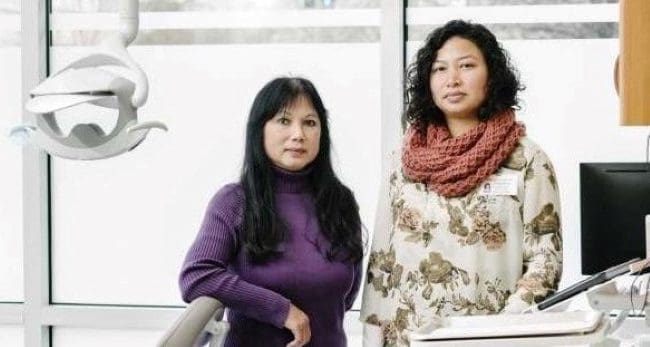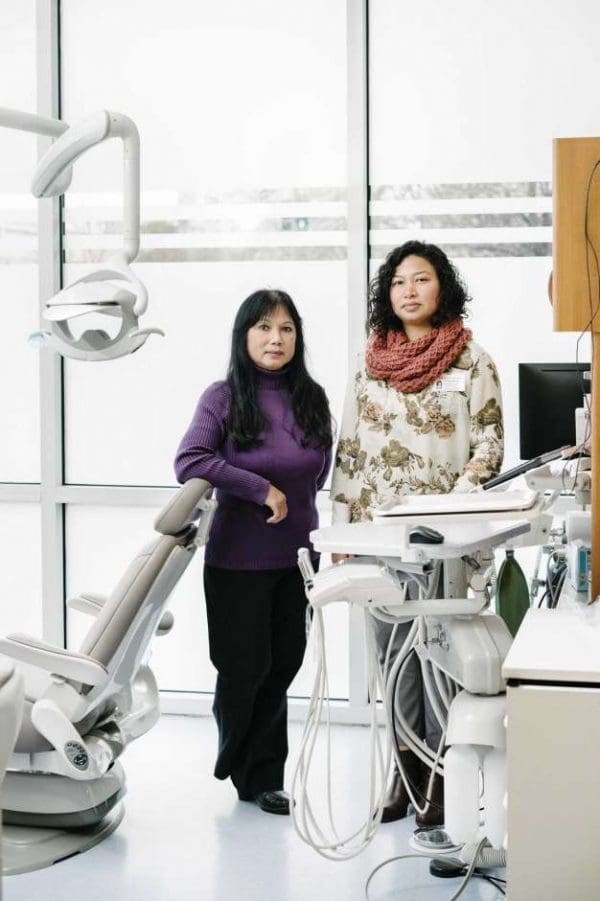

 Michael Short
Michael Short
By Ana B. Ibarra
Dr. Huong Le spends an average of 45 minutes with each of her dental patients during their visits, so she gets to know them well, especially the older ones who come in more than twice a year.
She hears about their families, stories from their home countries and, often, how lonely they feel. More than once, Le and her staff at Asian Health Services have heard their patients express suicidal thoughts.
Le, a dentist of more than 30 years, realized she needed to respond to her patients’ cries for help. Her dental clinic, located near Oakland’s Chinatown, started depression screening for patients 65 and older in 2017.
Then Le took the concept one step further last year by hiring a full-time mental health counselor and giving her an office at the dental clinic, where she can see patients immediately should they need it. Later this year, the depression screenings and counseling services will expand to patients 12 years and older.
“When you have someone who is telling you they’re going to go home and kill themselves, and you think, ‘I’m a dental provider what can I do?’ — that was one of the moments when I knew, wow, we need someone, a professional who is trained in this, here,” said Le, the chief dental officer at Asian Health Services.
The community health clinic, which operates several sites in Alameda County, primarily caters to Asian immigrants, a group that often shuns behavioral health services because of the stigma associated with mental illness.
While the kind of immediate, in-house handoff offered by Asian Health Services is available at many medical clinics, it’s a new concept at community dental clinics and virtually unheard of at private dental offices.
The model is winning praise from experts as an innovative way to make mental health services accessible to hard-to-reach populations.
Dr. Irene Hilton, a dental consultant at the National Network for Oral Health Access, said she hadn’t heard of any other community dental clinics featuring mental health practitioners.
Doing so “totally makes sense,” she said. “You can’t really engage in self-management of a chronic disease, including gum disease, or cavities, if you’re not in the right frame of mind.”
Dr. Lorna Flamer-Caldera, past president of the New York State Academy of General Dentistry, called dental offices an untapped resource for mental health care.
“Depression affects such a large segment of the population that all avenues that can be used to steer patients” should be utilized, she said.
Flamer-Caldera doesn’t screen for depression at her dental office, but she’s trained to look for signs of it. She encourages patients to visit their primary care doctors if she thinks they would benefit from professional help.
At Asian Health Services, patient check-in includes a survey form that asks whether the patient feels anxiety or sadness or has had negative thoughts. Positive responses lead to an invitation to chat with Zona Keo, the social worker and mental health counselor Le hired. Follow-up appointments with Keo also can be made.
Low-income immigrant populations who visit community health centers often don’t seek mental health services on their own, Keo said, and they face transportation, language and cultural barriers.
She believes it’s critical to offer her services in a place patients already plan to visit, like a dental clinic.
Stereotypes and misconceptions about mental health are common among the clinic’s older immigrant patients, but even some younger patients are reluctant to seek help, Keo said.
“We have patients whose parents were refugees, and they feel guilty to talk about mental health because they think, ‘Well, my parents went through an actual struggle — they went on a boat, swam across a river, walked through bombs, and here I am complaining about mental stress,’” she said. “So they keep quiet.”
To avoid scaring patients away, Keo refrains from using terms like “emotions” or “therapy.”
“I have to feel out the patient and say what I think is appropriate for each individual,” said Keo, who speaks the Cambodian language Khmer in addition to English.
Donna Jung, a social worker at Asian Health Services, noted that having a mental health provider on site makes it easier for patients to avoid saying they’re going to therapy, because it’s a dental office.
“Some patients don’t even tell their families” out of fear of being stigmatized or worrying their kids, Jung said.
So far, Keo’s list of referrals from the dental clinic has been short, and patients frequently cancel appointments or say they feel better after one visit, she said.
She expects more traffic when the clinic starts screening younger patients later this year, and patients become more familiar with her role.
“I want patients to know we’re here for them,” she said, “and that this is a dental office but also a safe space for mental health.”
Ana B. Ibarra is a writer for Kaiser Health News, which publishes California Healthline, an editorially independent service of the California Health Care Foundation. KHN is not affiliated with Kaiser Permanente.
